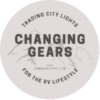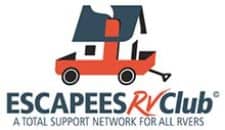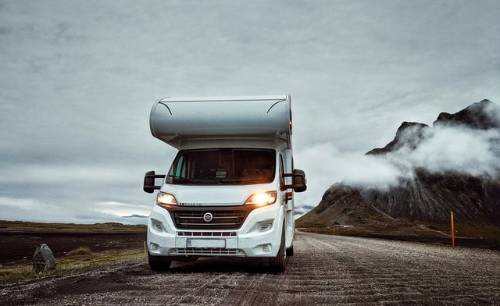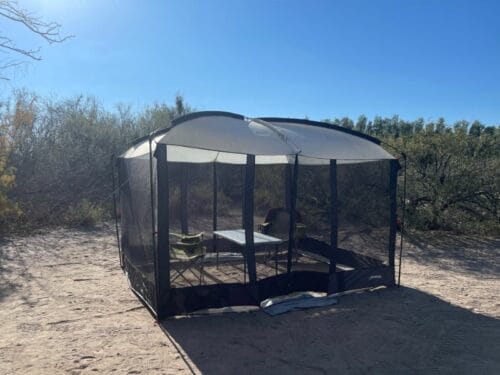“If you could go back in time and ask your RV salesman a question, what would it be?”
We asked this question to RV owners from all over the country! And they delivered.
Navigating an RV dealership sales lot is notoriously … swampy. And your guide is usually a salesman with only a cursory knowledge of an RV’s inner workings!
Here are the questions you should really ask at an RV dealership. Print them out and be ready to play hardball!
You can view the original questions and answers on Facebook, Quora and Twitter.

TELL, DON’T ASK!
K. Baker doesn’t pull any punches. He says:
“Don’t ask questions…start by telling the salesman:
- Whether you prefer towable RV or motorhome
- What your budget is (don’t hedge on this; it’s important!)
- Here’s what and how we’ll be using our RV
- There are ‘X’ number of travelers.”
In other words, draw a road map for the salesperson. Don’t ask him or her to educate you. Just tell him exactly what you want, and let him find it.
T. Delinger feels the same way. “Strangely enough, I have little use for asking questions at an RV dealer. We have very specific things we like and don’t like.”
As an experienced RVer, T. Main researches his favorite brands, browses floor plans, compares features, and narrows his shortlist to 2-3 or three favorites. He then finds the closest reputable dealer with those RVs and goes shopping.
“Start a list of what is important to you,” he advises. “Start a big spreadsheet and track models against this list. Add lots of notes. Cross them off (but don’t delete them) as you reject them. Highlight the ones you like best. Keep iterating!”
D. Cheatwood is even more succinct. He knows exactly what he wants. You should ask, “Do you have this particular model?” he says. If not, take a walk!
WHAT’S THE INSPECTION PROCESS?
By far the number one recommendation is to carefully inspect the RV before you purchase!
T. Hohback, and several others, recommend paying a certified inspector. I concur! If you’re new to the RV world, you won’t know what to look for. And experience makes vision 20/20. Bring in an independent inspector to carefully view the RV before purchase, with power and water hooked up!
D. Mac Vie says, “A [PDI is] time-consuming but well worth it. If the dealer won’t agree or wants it rushed or says things will be fixed later, go elsewhere!” B. Travis goes a step further and advises you to “take short videos of the entire walk through and have them turn EVERYTHING on.” If any conflicts arise later on, you’ll have indisputable video evidence.
Never accept a defective RV! Don’t accept a handshake deal that something will be fixed later. If it ain’t fixed, it ain’t worth buying.
If you want to conduct your own PDI inspection, you can download this checklist.
WHAT’S THE MAINTENANCE CONTRACT?
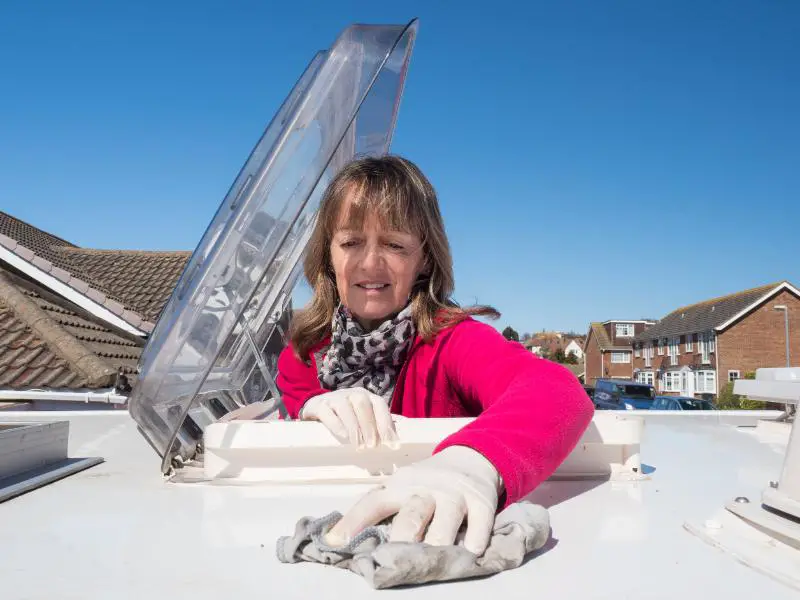
No, I’m not talking about extended service warranties (which aren’t even warranties, in the strict sense of the word). Many RVers advise against purchasing any sort of extended warranty because of all the gaps and loopholes!
Instead, I’m talking about a standard fare maintenance contract that comes with the purchase of a new RV. S. Jones says, “My #1 [question] would be [a] maintenance contract, if they’re going to stand behind their product. I want the answer in writing and notarized. Bumper to bumper, top to bottom.”
You should also ask about their average service wait time. Is it 2 weeks? 2 months? 6 months? Better yet, ask for customer references!
This dealer’s warranty is in addition to the manufacturer’s workmanship and materials warranty.
Which is in addition to any warranties offered by third-party component manufacturers.
(Confused yet?)
ARE YOU AN RV OWNER?
You want to avoid two extremes when dealing with a salesman:
- Don’t assume he’s a nincompoop who can’t tell an air conditioner from a water heater.
- Also, don’t assume he’s a mechanical genius with an encyclopedic knowledge of the RV industry.
Most are somewhere in the middle. You want to avoid the first and take advantage of the second. Some salesmen really are worth their weight in gold!
Casually, politely inquire about their history. Do they own an RV? If so, how long? How long have they been selling RVs?* If you’ve stumbled upon a real-life RV owner with a deep love of the open road, you’ve hit the jackpot!
*This is especially true at an RV show, where many salesmen are just temporary hired help!
ASK ABOUT THE MARKUP (DISCOUNTS!)!
E. Donaldson wants to know how much profit the dealer stands to make. “How much of a markup does your dealership have?” she suggests asking.
Yes, all dealerships have a markup. That’s how they make money. No money, no business, no RVs.
Dealerships have a 30-70 percent markup. MSRP will often be advertised at 40-70 percent over dealer cost, and the dealer will sell for 10-30 percent less.
Personally, I wouldn’t ask directly, “What’s your markup?” No dealer will answer that honestly, if only because it’s regarded as extremely rude in our culture. You don’t ask your waiter how much money the restaurant is charging above the cost of food, do you? You don’t haggle with a cashier over the price of cucumbers, right?
Instead, ask about discounts. Dangle the sale. Suggest that you could buy that afternoon with the rest price (but be prepared to walk away no matter what!).
Expecting a 10-25 percent discount is reasonable. Some dealerships may offer up to 30-40 percent for stagnant RVs sitting on the lot for over a year. On average, a dealer pays 1.5 percent of a unit’s invoice cost every month it sits on the lot.
The more expensive the RV, the greater the room for discounts. You won’t see huge discounts on a $24,000 bargain-basement travel trailer. But if you’re shopping for a $110,000 luxury 5th wheel that’s spent 14 months on the lot? Now you’re talkin’!
Don’t expect discounts in excess of 30-40 percent. A dealer pays money for PDI inspections, lot fees, salesman salaries, etc. You’ll never get an RV for the invoice cost.
CHECK THE DATES!
You’re buying a new RV! You expect like-new materials, then, right?
L. Robertson recommends to “check date on tires, how long has it been on the lot? Check caulk.” She’s right! Units that spent four months outside at the factory waiting for backordered parts, one month in the shipping lot waiting for delivery, and 15 months on the sales lot waiting for purchase – well, they’ve seen some wear and tear!
Here are the dates you should check:
- Build date (from the factory)
- Delivery date (to the dealership)
- Age date (of the tires)
It’s not healthy for trailer tires to sit longer than 6-12 months. This can accelerate the onset of tire dry rot.
(DON’T) ASK ABOUT THE WEIGHT!
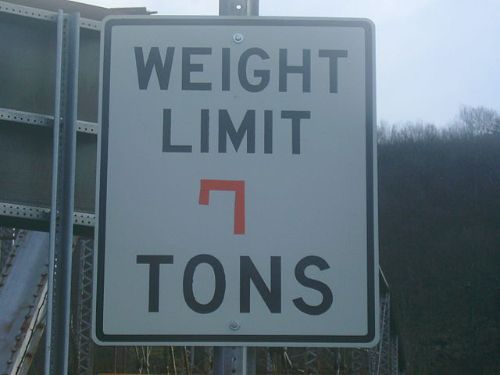
Don’t ask the salesperson about the tongue weight, cargo carrying capacity, empty weight, or any other specifications! Do you really expect him to have memorized those obtuse numbers? Or that he won’t fudge an estimate or two?
Look at the stickers yourself!
Every RV has tire and VIN stickers posted on the outside of the rig, road-side wall, towards the front. These stickers will tell you the CCC, GVWR, GAWR, body length, and tire size.
A special note on the cargo carrying capacity (CCC): Many RVs, especially cheap travel trailers, are sold with insufficient cargo capacity! In extreme cases, by the time you’ve filled up all the cabinets and filled the freshwater tank, you’re out of room. I recommend a minimum of 250 lbs per person or 2,000 lbs, whichever is greater.
Unfortunately, the stickers won’t tell you tongue weight. You’ll have to look up the factory tongue weight estimate online and then add the weight of batteries and fuel.
(DON’T) ASK ABOUT THE BUILD QUALITY!
A lot of shoppers suggest asking about quality. Be careful, however. You don’t want to ask a salesman, “Which of these pieces of junk are actually built with decent quality?” You’re putting him on the defensive, insinuating that most of what he sells is shoddy crap and he should apologize for even bothering you and go rethink his life choices. You won’t get good service that way!
So here are some alternative ideas for sniffing out quality.
- C. Fuller suggests asking, “Has this unit been pressure-tested for leaks?” That’s a great question! – except that every RIVA RV manufacturer must leak-test and flood-test their water supply and DWV plumbing prior to shipping. So it’s a moot question.
- D. Silverstein jokingly (I hope) wants to know, “Is this really held together by staples??” Great question, but no salesman will give you a straight answer! My advice is to peek underneath the beds and inside cargo compartments. If you see big framing gaps, splintered plywood, and haphazard stapling patterns, that’s not a good sign of quality.
- J. Dixon phrases it this way: “Which RV is quality built for full-time traveling?” I would rephrase the question as, “Which manufacturers specialize in full-time RVing?” Or “Which RVs are designed for rough roads and boondocking?”
But my best advice is to do your own research. A salesperson will direct you to a brand he carries.
Best to focus on brands that specifically cater to full-time RVers and off-road travelers. You’ll find several such companies, such as DRV Luxury Suites, Tiffin, Pleasure Way, and Northwoods Manufacturing.
Andy Herrick is a blogging nerd, #8 Enneagram, wannabe bread baker, INTJ, RV industry professional, and small business entrepreneur. He can be found hanging out with his lovely wife and family, skiing, cycling, climbing, hiking, and convincing anyone who will listen why dogs aren’t really that great of pets. Also, he runs this website.
-
Andyhttps://changingears.com/author/andrew-herrick/
-
Andyhttps://changingears.com/author/andrew-herrick/
-
Andyhttps://changingears.com/author/andrew-herrick/
-
Andyhttps://changingears.com/author/andrew-herrick/
